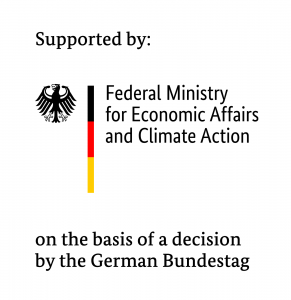
The focus of the federal research project is the storage of electricity from renewable sources in the form of methane. The core of the project is the conversion of carbon dioxide and hydrogen to methane by means of biological methanation. In a trickle-bed bioreactor, archaea perform the central task of methanation. With this project, the project partners want to provide another building block for the implementation of the energy transition, bring the power-to-gas (PtG) technology closer to application and thus contribute to tackling climate change.
The aim of the project is to expand a trickle-bed bioreactor (ORBIT demo) for biological methanation with archaea to include an electrolyzer, gas processing and storage capabilities, including the necessary peripherals. An electrolyzer with a proton exchange membrane (PEM) will be adapted and extensively tested for this purpose. New glass-based packing materials are being developed, manufactured and investigated for their use in the bioreactor. Parallel to the investigations in ORBIT-Demo, a twin is being built on a 5 L scale for further investigations. The overall ORBIT-Demo plant is operated with various bio- or waste gases from industrial processes as CO2 sources. Methanogenic cultures achieving high conversion rates and suitable for the different gases will be identified. Finally, as a field test, the plant will be integrated and operated at the wastewater treatment plant in Pfaffenhofen a. d. Ilm.
Potential sites for PtG plants with biological methanation will be identified in Germany and evaluated on different quality criteria. Based on the results obtained in ORBIT-Twin and ORBIT-Demo, an upscale of the plant (ORBIT-Industry) will be planned and designed for one of the identified industrial sectors.
The project is a direct continuation of the BMWK-funded project “ORBIT” (“Optimization of a trickle bed bioreactor for the dynamic microbial biosynthesis of methane with archaea in power-to-gas plants”). The interdisciplinary consortium pursues the system integration and cost reduction of power-to-gas plants as well as the use of biogenic waste materials (waste gases) as educt gases for methanation as its overriding goals.
Reactor data:
Electrolysis data:
Operrational characteristics:
